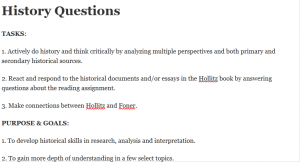History Questions

TASKS:
1. Actively do history and think critically by analyzing multiple perspectives and both primary and secondary historical sources.
2. React and respond to the historical documents and/or essays in the Hollitz book by answering questions about the reading assignment.
3. Make connections between Hollitz and Foner.
PURPOSE & GOALS:
1. To develop historical skills in research, analysis and interpretation.
2. To gain more depth of understanding in a few select topics.
3. To experience a variety of historical sub-disciplines, such as social history, diplomatic history, cultural history, etc.
DIRECTIONS:
· Homework is an informal assignment, but homework must still be typed (single or double spaced is fine).
· You can write in paragraphs or bullet points. Don’t need to worry too much about spelling or grammar or sentence structure. You do need to explain your answers.
· Include some historical details and examples to help “prove” your points and to illustrate what you say.
· Include page numbers (so that you can refer back to things & find them again).
· There is no required length, but you can probably expect to write roughly 1 – 1 ½ pages in response to most homework assignments.
· Use your own words – summarize and paraphrase what you read. Don’t copy words or sentences directly from the book except for the occasional, purposeful use of direct quotations. And, when you do use quotes, cite them with the author’s name & page #.
GRADING: Your homework will be graded on a 10 point scale: A = 9.5, B = 8.5, C = 7.5, D = 6.5. You will not automatically lose points for an incorrect answer. You earn credit for effort and for evidence that you are reading deeply and trying hard to answer all the questions. We will make corrections and add information in-class (through instructor feedback and Discussion Forums).
NOTE: Generally speaking, late homework will not be accepted, but if you run into problems, please talk to me!
SPECIFIC INSTRUCTIONS FOR THIS WEEK:
IMPORTANT:
· Read Ch. 18, pages 681-714, in Foner first. This will give you the background you need to understand Hollitz Ch. 5.
· Then read the introduction to Ch. 5 and Source 1, pages 109-118, in Hollitz.
· Read the rest of Ch. 5 in Hollitz as assigned in #3 below:
Please do your best to respond to the following questions based on what you read.
1. Based on what you read in Hollitz pages 109-118, define the terms:
a. bungalow;
b. Arts and Crafts movement.
2. ***The author of Source 1, contemporary historian Gwendolyn Wright, argues that the bungalow was a “Progressive” house – why? What made the bungalow “Progressive” according to Wright?
a. HINT: be very careful to define “Progressive” first – using Alison’s powerpoint slides and Eric Foner’s definition.
b. Write at least one paragraph or 5 – 7 bullet points in response. Include important and interesting details.
3. ***Read the following primary source documents: 5, 6, 8 (and 9) and 10, all of which describe and explain the appeal of the bungalow to a variety of different people. Importantly, their reasons for supporting the bungalow as a “Progressive” house differ significantly. Choose three of these source documents (#5, 6, 8, 9 and/or 10) and respond to the following:
a. Identify the document (who wrote it, when, what kind of document is it and who was the intended audience).
b. See if you can find references to this person in Source #1 – the essay by Gwendolyn Wright. Summarize and comment on what you find.
c. Based on the primary source document and what you read in Wright, explain the reasons why the bungalow appeals to the author and comment on important and/or interesting points. If possible, identify what makes this author’s view “Progressive” (What problems does the bungalow solve?).
a. HINT: use the definition of “Progressive” provided in Alison’s powerpoint slides and/or Eric Foner’s book.
4. Optional: how and in what ways do contemporary residential building styles reflect our society today?
***NOTE about cause-and-effect: The documents in this chapter describe the effects that the Progressives HOPED the new bungalow-style houses would have, but there is no evidence here to tell us whether or not the desired effects actually came about.